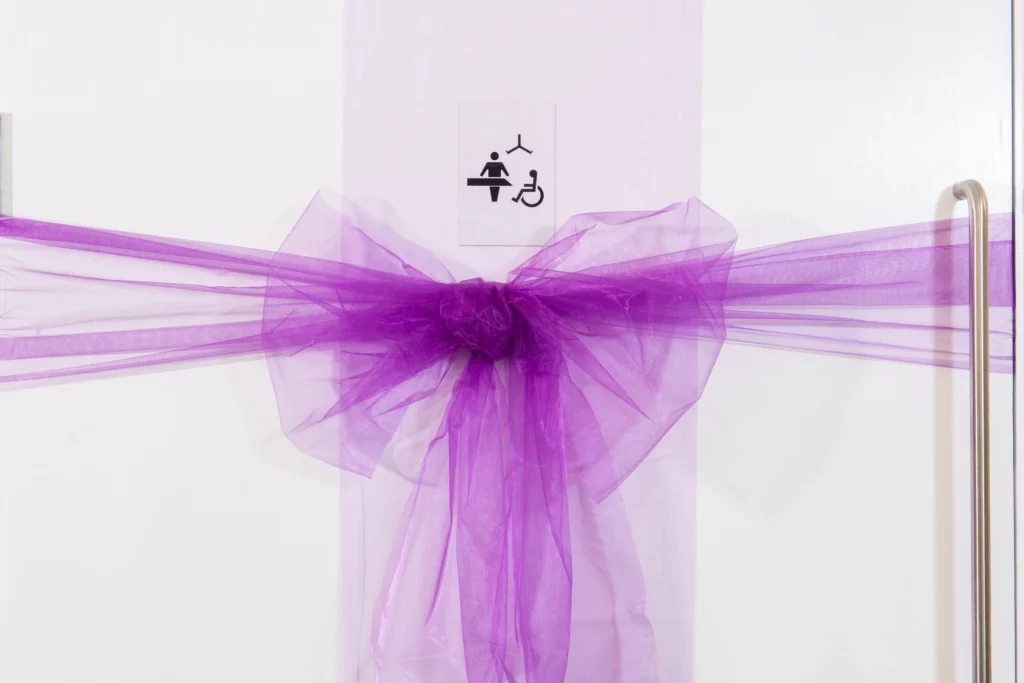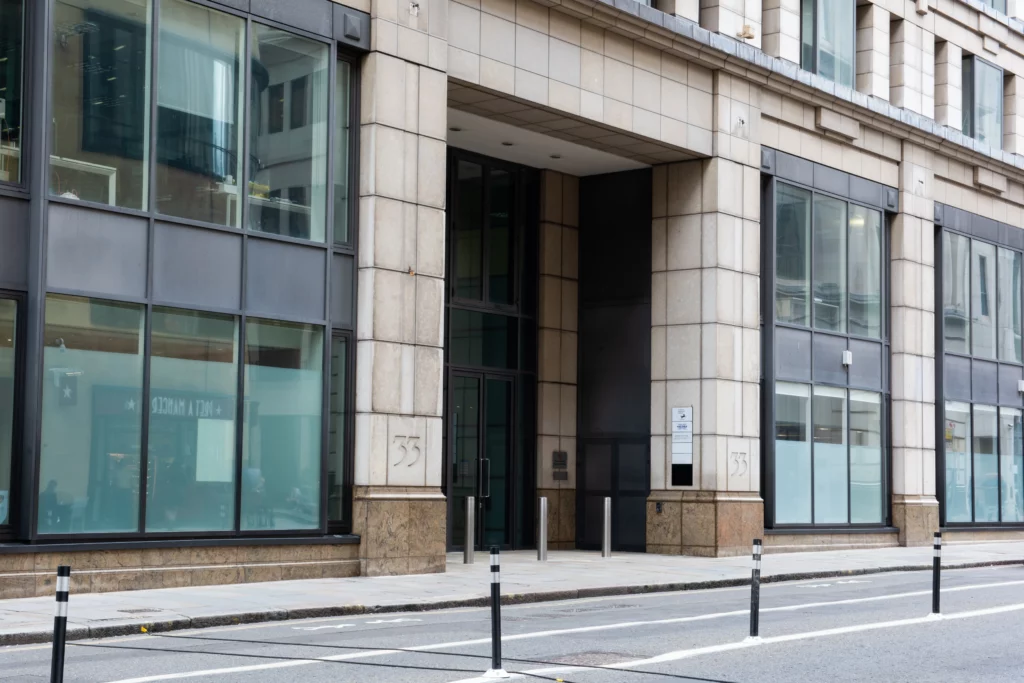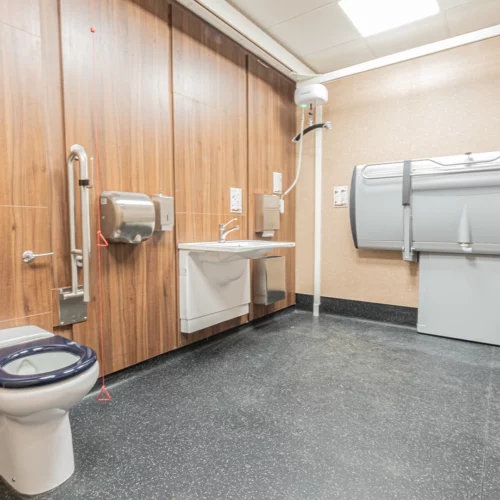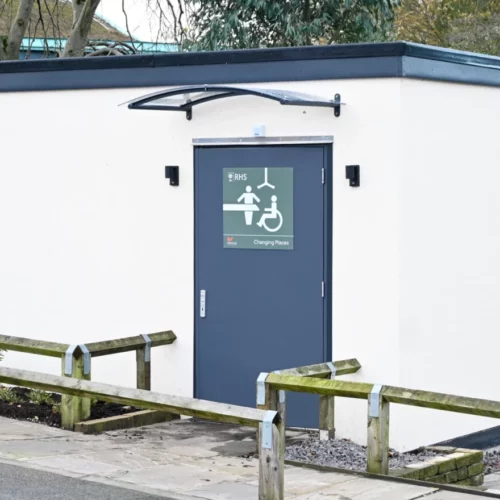The Importance of Changing Places in the Workplace
Posted on 22 August 2024 By Michael Wood

In This Article
When you work or visit an office, how many Changing Places in the workplace do you see?
In today’s world, accessibility is not just a legal requirement—it’s a moral and social obligation for businesses. Creating an inclusive environment that caters to the needs of all employees and customers is essential to help businesses grow and foster more diverse work spaces.
One of the most crucial aspects of workplace accessibility is the provision of Changing Places toilets. These facilities are specifically designed to meet the needs of individuals with profound and multiple learning disabilities, as well as other disabilities.
As one of the leading suppliers of Changing Places, we’ve put together a quick guide on why more Changing Places in the workplace are needed, highlighting our work with Lloyds Banking Group who are setting a new standard in workplace accessibility.
Why are Changing Places needed?
Over 250,000 people in the UK need access to a Changing Places toilet. Unlike a standard accessible loo, Changing Places are designed for people with complex disabilities, requiring more space and specialised equipment, such as height-adjustable changing benches and hoists.
Without access to Changing Places toilets, many people are forced to make difficult choices. Either they avoid certain activities or locations altogether, such as going to work in an office, or resort to unsafe and unhygienic practices, such as changing on a toilet floor.

Changing Places can play a vital role in boosting accessibility in the workplace.
A lack of suitable facilities not only excludes people from participating fully in society, it also impacts their families and carers.
That’s why more Changing Places in workplace is needed. By incorporating these toilets, workplaces can significantly improve the quality of life for employees and customers who need these facilities. It ensures that everyone, regardless of their physical abilities, can access the same opportunities and environments as others.
Read our blog on ‘Why Changing Places are important’ to find out more about their benefits.
Growing Corporate Responsibility Awareness
Businesses are becoming more aware of the important role they play in promoting accessibility and inclusivity. Many have acted to comply with legal standards, especially new buildings. Others have worked hard to make their venues more accessible, particularly for customers and visitors.
However, one aspect that is often overlooked is about creating work environments that value and respects the needs of all individuals. Accessibility should be a fundamental aspect of corporate social responsibility, and this includes providing adequate facilities like Changing Places toilets.
Prioritising accessibility has far-reaching benefits. For employers, it leads to a more diverse and inclusive workforce, driving innovation, improving employee satisfaction, and enriching the company culture. From an external point of view, the resounding message is one of a business committing to equality, enhancing brand loyalty and public perception.
It is also important to note that the legal landscape is evolving, with increasing pressure on businesses to take further steps to ensure they offer adequate facilities for people with disabilities.
By taking proactive steps, such as installing Changing Places in the workplace, companies can stay ahead of regulatory requirements and demonstrate their commitment to inclusivity.

Lloyds Banking Group Changing Places
Workplace Changing Places Solutions
Implementing Changing Places toilets in the workplace is a tangible way for businesses to improve accessibility. While the installation process may seem daunting at first, it is achievable with the right planning and expertise.
Here are a couple of tips of how to make installing Changing Places in the workplace a smoother process:
1) Work with an approved supplier
We’ve seen many instances where organisations have opted to use different suppliers to install different parts of a Changing Places. The result? A facility that doesn’t meet the standards required to have it registered and leaving the venue to stump up additional costs to get it rectified.
By working closely with the Changing Places Consortium, they can advise you on an approved list of suppliers to use, all of whom have years of experience of installing compliant facilities internally and externally.
View the full list of Changing Places suppliers
2) Ensure Changing Places are built into office design plans
One of the common challenges and barriers that prevent organisations from installing a Changing Places in the workplace is lack of space.
For those who are looking to refurb their existing premises or move to a brand new one, it makes sense to ensure a Changing Places is part of the design plans for an office.

More offices are becoming more aware about the importance of office design and layouts to increase accessibility.
With the help of an approved supplier, they can guide you around the considerations for designing a Changing Places internally, ensuring it meets the space requirements and helping you think more widely about access to and from the building itself.
3) Modular Solutions
As mentioned above, some work premises have a lack of internal space to house a Changing Places in the workplace. However, there are modular solutions that can help solve that problem.
Modular Changing Places are increasingly becoming more popular, providing a compliant facility located outside, usually in a car park for easy access.
Not only do they solve the issue posed by existing buildings, they also provide the benefit of quicker installation as the majority of the building work is carried out offsite.
Discover more about modular Changing Places by watching our video below.
Innova and Lloyds Banking Group
Inspired by Accessibility Manager, Ross Hovey, Lloyds Banking Group are setting a precedent for raising awareness about importance of accessibility at work. By sharing his personal story, Ross has led their campaign across their people and places, showcasing the importance of ensuring work environments have the right levels of access for colleagues with different care needs.
A large part of this campaign is to incorporate more Changing Places in the workplace, offering inclusive toileting facilities to both staff and wider public wherever possible.
Partnering with Innova Care Concepts, they became the first bank in the UK to install a Changing Places toilets in 2022, with a facility situated at Old Broad Street in London.
Since then, Innova and Lloyds Banking Group have installed and opened a further three Changing Places. Offices in Andover, Bristol Harbourside and Leeds all have Changing Places toilets for staff to use, featuring specialist equipment such as an overhead hoist system and a height adjustable changing bench.
Having Changing Places can help transform working environments, providing opportunities for more people with complex disabilities to feel safe and comfortable in the workplace.
Take a look at the video below to learn more about Innova and Lloyds Banking Group’s mission to enhance accessibility at work.
Summary
The installation of Changing Places toilets in the workplace is more than just a facility upgrade—it’s a statement about the values and priorities of a business. As shown with Lloyds Banking Group, leading the way in accessibility can have a profound impact on employees, customers, and the wider community.
For businesses looking to enhance their accessibility, partnering with experts like Innova Care Concepts can make the process easier. By investing in Changing Places toilets, companies can ensure they are providing an inclusive environment that meets the needs of everyone.
For more information on the options available to help your workplace become more accessible with a Changing Places, complete the contact form below.
Related Products
Speak to The Experts
Need assistance with product enquiries, general inquiries, or product support? Our Phonelines are open 9am - 5pm Monday to Friday
0113 519 0319
Or, fill out the form for a call back.


